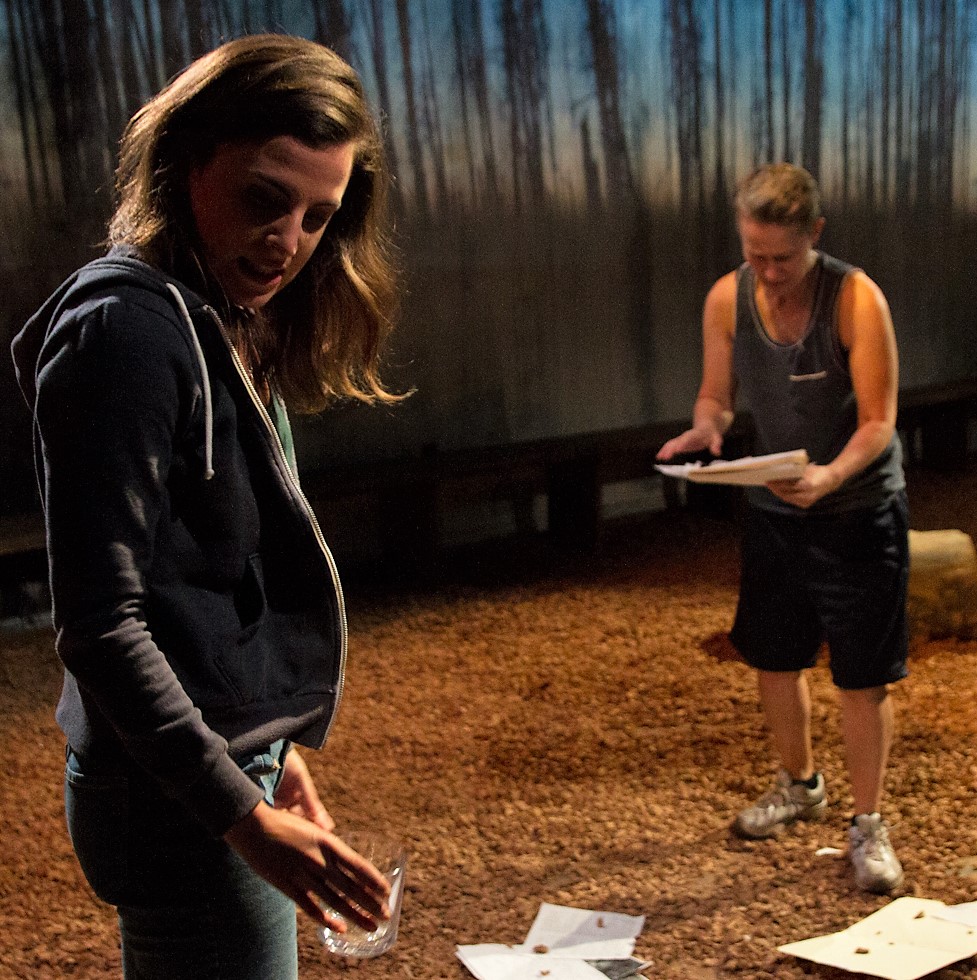Harrison David Rivers’ play Only You Can Prevent Wildfires takes as its jumping-off point an actual conflagration known as the Hayman fire, the worst blaze in Colorado’s history. Sparked mysteriously on June 8, 2002, the fire burned 137,000 acres and destroyed 133 homes. Fire Prevention Technician Terry Barton later admitted to starting it after burning a letter from her estranged husband. That letter is a focus of several speeches—the play begins with Terry’s insistence that she didn’t read the letter, but rather put it in her purse—yet it’s a mark of Rivers’ skill that by the end of his riveting play one still doesn’t know the contents of it.
Rather than solve the mystery, Rivers has chosen to imagine the internal conflicts of a group of characters. The title plays off the well-known motto of Smokey the Bear, who is a character in the drama (embodied by Adam A. Keller in a Smokey mask and full Forest Ranger regalia), but the wildfires turn out to have a metaphorical meaning as well.
Mikaela Izquierdo (left) is Kai and Drae Campbell is her partner Kim in Harrison David Rivers’ Only You Can Prevent Wildfires. Top: Izquierdo (center) with John J. Concado as John and Meryl Jones Williams as Terry Barton.
In a tightly constructed series of scenes, flashbacks, fantasias and monologues that extend back to Terry’s first meeting with her future husband, John Barton, at age 14, one follows their courtship, her determination to be a Forest Technician, the uprooting of their family (they have two daughters) from California to Colorado so Terry can take her job, and John’s personal frustration at his wife’s intensity and gradual lack of physical interest in him, even as he remains hopeful.
On a parallel track, meanwhile, one also meets Kim (Drae Campbell), a Forest Ranger who is in a bumpy lesbian relationship with Kai (Mikaela Izquierdo), her partner who has relocated from New Mexico as a sacrifice to assist her Kim’s career in the Forest Service. “In Santa Fe I was a boss,” Kai tells John, whom she meets at a dive bar where they are drinking away their frustrations. “I fired and hired. I budgeted. I inventoried. Here I’m a housewife.”
As the play unfolds, Rivers imaginatively draws parallels between the intensity of Kim and Terry, and their determination to pursue their careers ahead of their personal lives. The neglect of their partners, Kai and John, is because, metaphorically, they don’t pay attention to or put out the “wildfires” in their personal relationships. But the play also suggests that pursuing one’s dreams taints the possibility of happiness with their partners—or at least comes at a great cost. Whether Rivers is suggesting that women can’t have it all is uncertain: Kim acknowledges that ... if it had to happen I wish that it’d been a man instead of—that it wasn’t you versus me, two women at odds.” But Rivers makes it universal: in the case studies here, it’s clear that there are no winners when one mate, no matter the sex, subsumes his or her happiness to accommodate the other’s monomaniacal career ambitions.
The play contains a great deal of talk, but Sherri Eden Barber, who directs and is also credited with conceiving the story, never lets the pace slacken. At times choreographers Caitlin Bailey and Ali Perkins enhance the speeches with stylized physical actions. Superb projections by Joey Moro fill the walls: the forest primeval, then blackened, and images of the 2002 inferno.
Concardo plays the feckless but likable husband of the accused arsonist. Photos by Jody Christopherson.
The performances are excellent, with the charismatic John J. Concado beautifully capturing John’s fecklessness as well as his charm, his loneliness and the pain of being with a woman he adores who clearly likes him less and less. It’s painful to watch his reactions as she excoriates him for planning a trip—he works construction around the country for months at a time—and not telling her till the day he’s leaving. She’s right, but one senses that her intensity is as much a factor in his periodical departures as anything. His patience seems bottomless.
Campbell as Kim embodies a trait just like Terry’s: “In high school I was named most intense.” She’s petite but tough and determined, often barking questions in her interrogation of Terry. Izquierdo’s Kai is more easygoing, and the actress conveys the mismatch of temperaments with Kim subtly, yet their chemistry is also not in question.
Most important, Meryl Jones Williams is a perplexing, stubborn Terry. Determined to succeed and have it all, there is something unhinged about her, and more than a little selfish. “I was at that ‘I’ve had enough’ point,” she explains of her marriage. “That ‘I’ve got to get on with my life’ point … and I had to have this relationship over ’cause even though you still care for someone, even though there are all these feelings still, you have to move on.”
Ultimately, Rivers’ play doesn’t solve the “why” of what Terry Barton did, but that’s irrelevant. It is a compelling story; a fascinating showcase for several enormously talented actors; and a credit to the Ricochet Collective, which commissioned it.
The Ricochet Collective’s production of Only You Can Prevent Wildfires runs through Oct. 28 at Teatro Circulo (64 E. 4th St., between the Bowery and Second Avenue). Performances are Thursday through Saturday at 8 p.m. and Sunday at 7 p.m. with an additional performance on Monday, Oct. 23 at 7 p.m. Tickets are $25 and may be purchased by calling (800) 838-3006 or visiting ricochetcollective.com.





